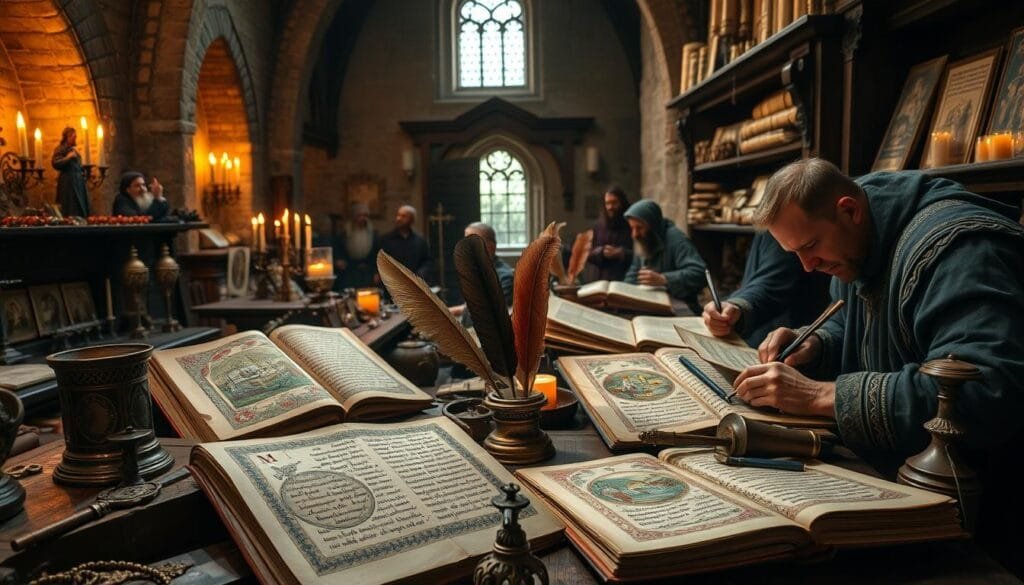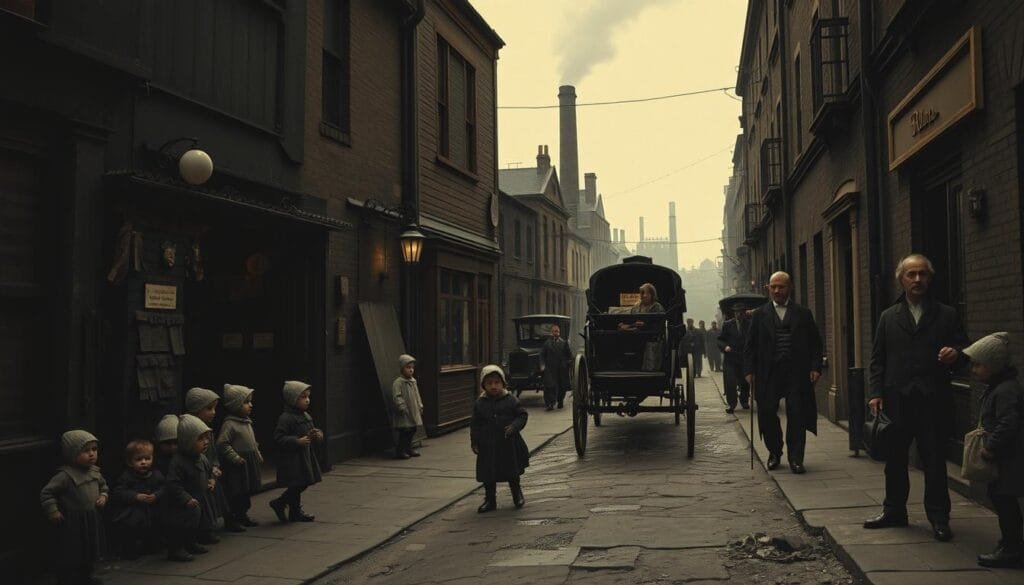Famous Authors Through History: A Literary Journey

Did you know Danielle Steel has sold over 800 million copies of her books? She even got a Guinness World Record for being on The New York Times bestseller list for 381 weeks. This shows how famous authors have greatly influenced our culture and knowledge.
Exploring literary history, we see how influential writers reflect and shape society. From ancient tales to modern stories, each author has made a lasting impact. This journey shows how literature grows with society, from Homer’s epics to Chimamanda Ngozi Adichie’s works.
Over time, writers like Charles Dickens and Fyodor Dostoevsky highlighted social issues and human struggles. Meanwhile, Dr. Seuss brought joy and wisdom to children through his stories.
Let’s start this literature journey to learn more about these legendary authors. We’ll explore from ancient stories to the latest in writing styles. Each part of this journey offers deep insights and inspiration.
The Origins of Literature: Early Influential Authors
The start of literature is filled with deep and old texts. Each one has added something special to how we write and share stories. We look at three authors from the beginning who are still important today.
Ancient Voices: The Epic of Gilgamesh
The epic of Gilgamesh is seen as the oldest great story we have. It shows us life in ancient Mesopotamia. Gilgamesh wants to live forever, learning about friendship, death, and what it means to be human.
This epic is key to ancient literature. It gives us a peek into the beliefs and values of long ago.
Homer and the Foundations of Western Literature
Homer, a famous Greek poet, wrote the Iliad and the Odyssey. These are huge works in Western literature. The Iliad tells of the Trojan War, and the Odyssey is about Odysseus’s journey back home.
Through these stories, Homer set the stage for how we tell stories and explore themes. He has influenced many writers and storytellers.
The Wisdom of Confucius
Confucius, a well-known Chinese philosopher, put together the Analects. It’s a collection of his teachings. The Analects talk about being a good person and a good leader. They also cover how to treat others and what justice is.
Confucius’s teachings have shaped Eastern thought and literature. They still inspire and guide many today.
Exploring early literature, we see how the epic of Gilgamesh, Homer’s works, and Confucius’s teachings mark the beginning of human writing. These stories and teachings deal with questions and experiences that are still important today.
The Rise of Classic Literature: Authors of Antiquity
Classic literature began with Roman poets like Virgil and Ovid. Their works, such as the Aeneid and Metamorphoses, are still loved today. They are known for their deep stories and beautiful poetry.
Virgil and the Aeneid
Virgil is a famous Roman poet. He wrote the Aeneid, which tells the story of Rome’s greatness. The Aeneid explores themes of duty, sacrifice, and destiny.
It has inspired many people over the years. The Aeneid’s impact on literature is huge.
Ovid’s Metamorphoses: Transformation in Poetry
Ovid’s Metamorphoses is a key work in classic literature. It’s a collection of myths told in beautiful poetry. Ovid’s skill in storytelling made Metamorphoses a classic.
The works of Virgil and Ovid have had a lasting impact. They have shaped literature and culture worldwide. Their legacy keeps classic literature alive and relevant today.
The Middle Ages: Authors of Sacred Texts
The Middle Ages lasted from AD 500 to the Renaissance. During this time, literature was closely tied to religion and sacred texts. Most literature aimed to teach or serve religious purposes. The Roman Catholic Church greatly influenced Western Europe, where Latin was the main language for written works.
In Eastern Europe, Greek and Old Church Slavonic were more common. This was due to the Eastern Orthodox Church’s influence.
The Role of Anonymous Authors in Religion
Many medieval authors remained anonymous. This was because the focus on individual authors was less important. Religious literature made up most of the works from this era.
Works like Jacobus de Voragine’s Golden Legend were very popular. They were even more read than the Bible. Besides religious texts, there were also secular works like Beowulf and the Song of Roland.

Dante Alighieri and His Divine Comedy
Dante Alighieri and his Divine Comedy are key figures in medieval literature. This epic poem is a major part of Italian literature. It explores themes of theology, morality, politics, and society.
Dante’s vivid descriptions and deep insights make the Divine Comedy a classic. It’s a timeless look at human existence and divine justice.
Monasteries played a big role in preserving and creating these texts. They had vast libraries with sacred texts, philosophical works, and scientific texts. The rise of universities also increased the need for academic texts, including Bibles and law books.
Medieval literature’s impact is still felt today. It shows the complex relationship between faith, literature, and society during this mysterious time.
The Renaissance: A Flourishing of Talent
The Renaissance was a time of great cultural rebirth. The arts and literature reached new heights. Cities like Florence and Milan grew, with over 100,000 people living there. Famous figures like *William Shakespeare* and *Michel de Montaigne* made huge impacts on *Renaissance* and *Elizabethan literature*.
Shakespeare, known as the “Bard of Avon,” and Montaigne, the father of the essay, changed literature forever. Their works still shape how we see and enjoy literature today.
William Shakespeare: The Bard of Avon
*William Shakespeare* was a key figure in *Elizabethan literature*. His plays, like *Hamlet* and *Romeo and Juliet*, and his *Sonnet 18*, show deep understanding of human emotions. His work on human nature and language is unmatched. Shakespeare’s influence on English is huge, with many phrases and words still used today.
Michel de Montaigne and the Essay Form
*Michel de Montaigne*, another Renaissance star, created the essay form. His sharp mind and writing style opened up a new way to express thoughts. Montaigne’s essays covered many topics, from life to society. They show how to mix personal thoughts with universal ideas, exploring the human mind deeply.
| Key Figure | Contribution | Lasting Impact |
|---|---|---|
| William Shakespeare | Dramatic works like “Hamlet” and numerous sonnets | Profound influence on English literature and language |
| Michel de Montaigne | Creation of the essay form | Foundation of personal and philosophical prose |
Their unique styles and groundbreaking works defined the *Renaissance*. They set the stage for future writers and thinkers. Whether through Shakespeare’s stories or Montaigne’s *essays*, the Renaissance shows the lasting power of human creativity and intellect.
The Enlightenment: Reason and Reform
The Enlightenment lasted from 1685 to 1815. It was a time when Europe’s thinking changed a lot. Writers like Voltaire and Jane Austen led the way, questioning old ways and pushing for change.
Voltaire: Critique and Satire
Voltaire was a key figure of the Enlightenment. He used his sharp wit and satire in works like Candide. In Candide, he attacked the wrongs of his time, like religious bias and foolish optimism.
His humor and questioning of power were bold. He pushed people to think and act with reason and fairness.
Jane Austen’s Social Commentary
Jane Austen also used her writing to comment on society. In books like Pride and Prejudice, she criticized strict class rules and gender roles. Her sharp observations and humor showed the limits of her time.
She advocated for being true to oneself and thinking clearly. Her work still influences us today.
The Enlightenment was a time of lively debates. Thinkers met in coffeehouses and secret groups. Voltaire and Austen, among others, challenged old ideas and pushed for change. Their work helped pave the way for future progress and freedom.
The 19th Century: A Time of Change
The 19th century saw big changes in society and industry. These changes were reflected in the literature of the time. Authors in England and America used their words to tackle big issues of their day.
Charles Dickens and Social Reform
Charles Dickens was a leading Victorian novelist of the 19th century. His books, like “Oliver Twist” and “Bleak House,” showed the harsh lives of the poor. Dickens wanted to change society and highlighted the poor’s struggles.
Through his stories, he called for a kinder world. His vivid tales exposed society’s flaws and urged for change.

Mark Twain: The Voice of America
On the other side of the Atlantic, Mark Twain shaped American literature. His famous works, “The Adventures of Tom Sawyer” and “Adventures of Huckleberry Finn,” captured the American spirit. Twain tackled tough issues with humor and satire.
His sharp observations gave America a voice. He used humor to highlight the nation’s moral and ethical struggles.
| Author | Notable Works | Key Themes |
|---|---|---|
| Charles Dickens | “Oliver Twist,” “Bleak House” | Social reform, urban poverty |
| Mark Twain | “The Adventures of Tom Sawyer,” “Adventures of Huckleberry Finn” | American identity, moral questions |
Charles Dickens and Mark Twain’s work has had a lasting impact. They tackled big issues of their time through powerful stories. Their writings still offer valuable insights into history and the push for change.
The Modern Era: Experimental Authors
Modern literature has changed a lot, thanks to authors like Virginia Woolf and Franz Kafka. They broke old story rules, giving us new views on the human mind and society.
Virginia Woolf and Stream of Consciousness
Virginia Woolf is famous for her use of stream of consciousness. In books like “Mrs. Dalloway” and “To the Lighthouse”, she shows us what characters think. This method lets us see into their minds, showing us the complexity of life today.
Woolf’s work has made her a key figure in experimental writing. She shows how thoughts can shape a story.
Franz Kafka: Surrealism and Alienation
Franz Kafka’s work has a big impact, especially in surrealism and alienation. His novella “The Metamorphosis” is a great example of his style. It mixes weirdness with deep questions about life.
Kafka loves to question what’s real and what’s not. His stories make us think about our world and our place in it. His work is a big part of modern literature, sparking talks about society and being alone.
If you want to learn more about breaking storytelling rules, check out an extensive list of experimental books. It’s a great way to dive deeper into this exciting genre.
| Author | Notable Work | Contribution |
|---|---|---|
| Virginia Woolf | Mrs. Dalloway | Stream of Consciousness |
| Franz Kafka | The Metamorphosis | Surrealism and Alienation |
| James Joyce | Ulysses | Modernist Styles |
| Thomas Pynchon | Gravity’s Rainbow | Postmodern Complexity |
| Julio Cortázar | Hopscotch | Interactive Narratives |
Postmodernism: Challenging Narratives
Postmodern literature burst onto the scene in the 1960s in the United States. It’s known for its complex stories and deep themes. Writers like Kurt Vonnegut, Thomas Pynchon, and Don DeLillo led the way. They drew inspiration from modernist legends like James Joyce and Virginia Woolf.
Thomas Pynchon and Complexity of Form
Thomas Pynchon’s books are famous for their complex stories and dense writing. His novel “Gravity’s Rainbow” is a prime example. It mixes characters and storylines in a way that breaks free from traditional stories.
Pynchon adds science, history, and culture to his tales. This makes readers think differently and engage more deeply with the story.
Don DeLillo’s Examination of Society
Don DeLillo’s novels offer sharp social commentary. In “White Noise,” he looks at how media and consumerism shape our lives. He shows the worries of today’s world.
His stories are as complex as the world he portrays. They make us think about the big issues of our time.
Today, postmodern literature still shapes American writing. Books like Dave Eggers’ “A Heartbreaking Work of Staggering Genius” and Jennifer Egan’s “A Visit from the Goon Squad” keep postmodern ideas alive. These stories mix personal tales with big cultural critiques.
Contemporary Authors: Voices of Today
In today’s literature, some voices really stand out. They create rich stories and share different views. These authors are changing how we talk and understand life.
Toni Morrison and the African American Experience
Toni Morrison is a key figure in today’s writing. Her books, like Beloved and Song of Solomon, explore the African American world. They show its depth and history.
Morrison’s stories talk about identity, pain, and heritage. They give a strong voice to African American stories. Her work is heard all over the world.
Chimamanda Ngozi Adichie: Bridging Cultures
Chimamanda Ngozi Adichie is also very important. Her books, such as Americanah, deal with identity, race, and gender. She connects cultures by sharing stories from Nigeria and America.
Through her stories, Adichie helps us understand different voices and experiences. She shows us the world from many angles.
Authors like Sally Rooney, Carmen Maria Machado, and NoViolet Bulawayo also shape today’s literature:
| Author | Notable Works | Awards |
|---|---|---|
| Sally Rooney | Conversations With Friends, Beautiful World, Where Are You | Multiple Book Reviews |
| Carmen Maria Machado | Her Body and Other Parties | Shirley Jackson Award nomination |
| NoViolet Bulawayo | We Need New Names | Booker Prize Shortlist |
| Ocean Vuong | Night Sky With Exit Wounds | TS Eliot Prize |
| Reni Eddo-Lodge | Why I’m No Longer Talking to White People About Race | Jhalak Prize |
These authors and others show why diverse voices matter in literature. They share stories from all over, making our world richer. Their work inspires us to be creative and open-minded.
The Future of Literature: Emerging Authors
The future of literature is bright, thanks to new authors bringing diverse voices to the table. These writers come from all walks of life, mirroring our global world. Their stories enrich our reading experience, making it more vibrant and inclusive.
Diverse Voices in Modern Literature
Globalization has changed literature, with authors from everywhere sharing their stories. Women and underrepresented groups are now more visible in writing. Thanks to platforms like Amazon Kindle Direct Publishing, more voices are being heard.
This shift celebrates diversity and sparks creativity. It’s changing what we call avant-garde literature today.
The Impact of Technology on New Writing Styles
Technology has changed how we read and write stories. With millions of e-books online, readers have endless choices. Self-publishing lets authors reach readers directly, without traditional barriers.
Online platforms also support new forms of storytelling, like interactive fiction. As technology grows, so will the ways we tell stories, offering exciting new views to readers everywhere.
Disclosure: This post contains affiliate links. If you make a purchase through these links, I may earn a small commission at no extra cost to you.






